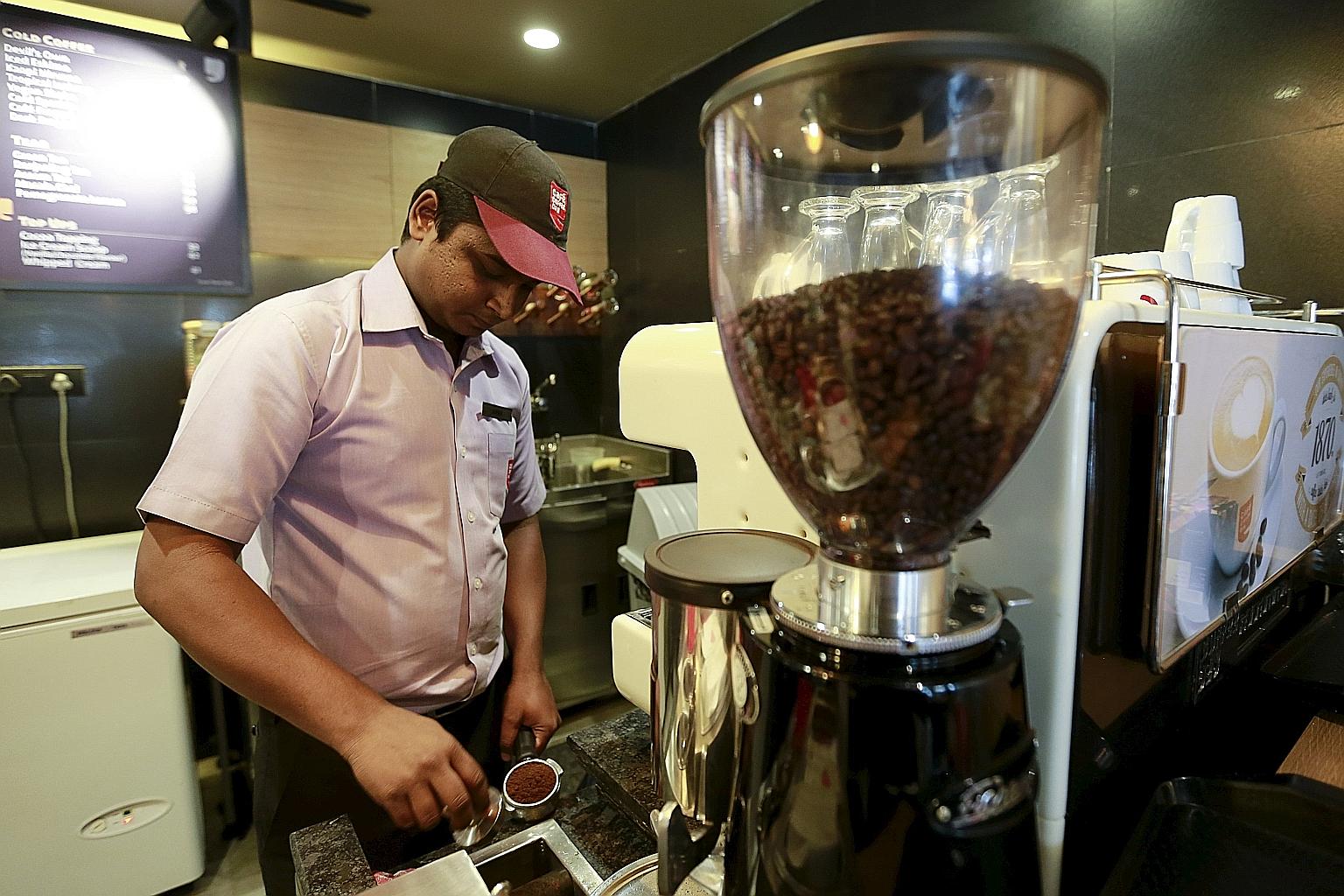Healthy Spaces
How much coffee is too much?
Joyce Teo finds out more about the negative effects of caffeine as coffee-drinking becomes more popular
Sign up now: Get ST's newsletters delivered to your inbox

While studies show that caffeine helps enhance physical and mental performances, drinking more than the safe recommended intake level can make you feel worse as caffeine is a stimulant of the nervous system.
PHOTO: REUTERS
Follow topic:
Caffeine is a part of many adults' daily routine and a morning brew usually helps them kick-start the day. But caffeine can also be a substance that people consume unknowingly as it is found not only in coffee, but also in other food and beverage products, and even medication.
While ingesting caffeine generally has no ill effects, too much of it is not a good thing either.
Late last year, a man in his 20s from Kyushu, Japan, was reported to have died from a caffeine overdose. He had drunk too many highly caffeinated drinks to help him stay awake in his job at a 24-hour petrol stand.
While rare, caffeine overdose has been reported elsewhere as well. So how much is too much?
Dr Lui Hock Foong, a gastroenterologist at Gleneagles Hospital, said a typical coffee drinker has nothing to worry about as a lethal dose of caffeine is 10-15g a day, which translates to 100 cups of coffee.
"It's difficult to consume this amount over a short time," he said.
"In the case of the Japanese man, he was consuming caffeinated energy drinks, which are more concentrated in caffeine. Caffeine pills were also found in his stomach."
However, it is easy to overdose on caffeine powder, which are sold as stimulants, warned Dr Lui.
"One can reach the lethal dose through ingestion, as in the case of an American teenager who died from caffeine toxicity in 2014," he pointed out.
The Food and Drug Administration in the United States has issued a consumer warning on powdered caffeine, as a teaspoon of it has the same amount of caffeine as about 28 cups of regular coffee.
Dr Desmond Wai, a gastroenterologist and hepatologist at Mount Elizabeth Novena Specialist Centre, said caffeine poisoning is now being recognised.
It is believed to be caused by the large intake of coffee within a short time and the cause of death is usually arrhythmia, or an abnormal heart rate, he said.
The caffeine level in blood is also affected by the way the coffee is made. Brewed coffee has more caffeine than instant coffee. Other factors include the volume of the coffee cup and drinks that are consumed around the same time, he added.
Here are four more things to note about caffeine.
DO NOT EXCEED FIVE CUPS OF COFFEE A DAY
The daily recommended caffeine intake for adults should not exceed 400mg a day, said Dr Lui.
Children should not consume caffeine at all and adolescents should limit their intake to at most 100mg a day, according to Mayo Clinic in the US.
Generally, an adult should not drink more than:
•Four to five cups of coffee, which have 80-100mg of caffeine per cup on average;
•Twelve cans of a standard Coca-Cola, with each containing 34mg of caffeine;
•Six cans of high-caffeine soft drinks, with 70mg of caffeine per can; or
•Five cans of energy drinks with 80mg of caffeine per can; or two cans if the energy drink contains double that amount of caffeine.
CAFFEINE IS FOUND NOT ONLY IN COFFEE AND CAFFEINE PRODUCTS
Tea can contain about one-quarter of the amount of caffeine in coffee, said Dr Lui.
Energy drinks, such as Red Bull and Monster, contain caffeine too.
Other products with caffeine include NoDoz caffeine supplements, Coca-Cola, Diet Cola, chocolate and medication, like Panadol Extra, said Dr Wai.
He suggested that drinkers try to limit themselves to two or three cups of coffee daily.
"Caffeine will naturally be broken down by our body, though drinking more water can help bring down the level in our body," he said.
INCREASED INTAKE DOES NOT EQUATE TO INCREASED ALERTNESS
Drinking more than the safe recommended intake level can make you feel worse as caffeine is a stimulant of the nervous system.
Doses above 1g will trigger unpleasant symptoms such as hand tremors, headaches, restlessness, heart palpitations and increased urination, said Dr Lui.
"Consuming caffeine above this limit can lead to caffeine toxicity that is potentially fatal."
Too much caffeine also causes diarrhoea and heartburn, said Dr Wai.
Dr Lui said one should resist the temptation to continually increase caffeine intake to keep awake as it is largely counterproductive.
"A minimum period of rest is essential for the body and should not be curtailed with stimulants."
CAFFEINE IS BENEFICIAL ONLY IN MODERATE AMOUNTS
New studies have confirmed the generally positive effects of caffeine when taken in modest quantities, said Dr Lui. The benefits are seen in the enhancement of physical and mental performances, as well as protective effects from several chronic illnesses, he said.
Said Dr Wai: "Drinking coffee has been shown to reduce risk of dying from cardiovascular disease, neurological diseases, liver diseases and even suicides."

